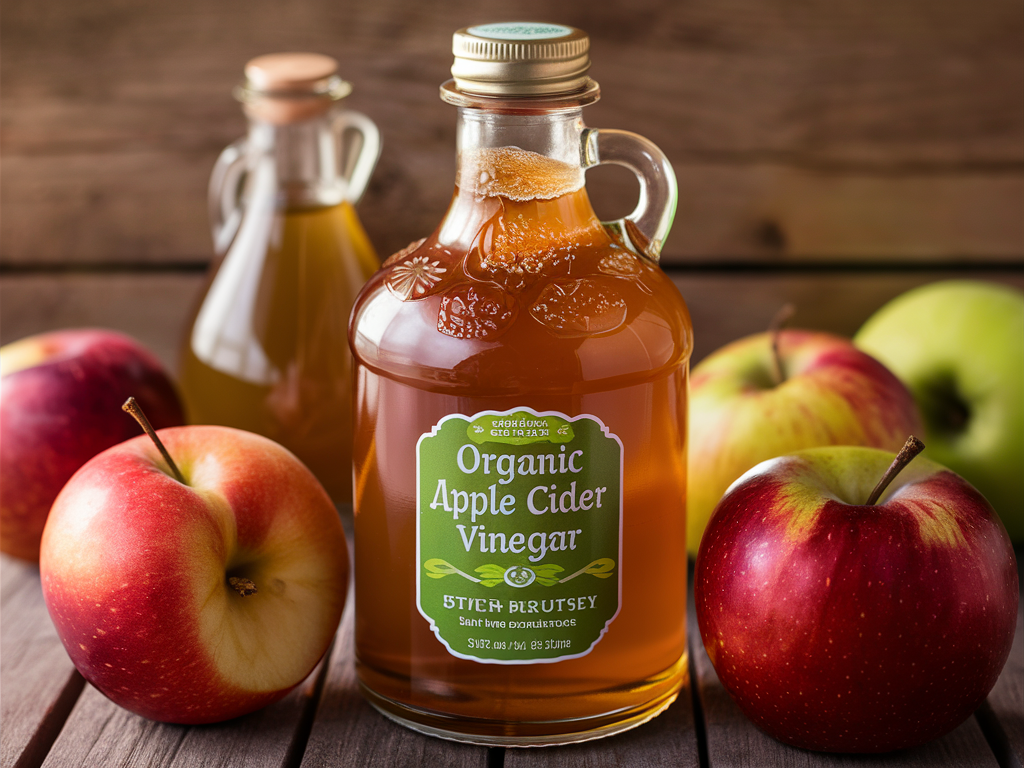Apple cider vinegar (ACV) has been used for centuries as a natural remedy for various ailments. This amber-colored liquid is created through a two-step fermentation process where crushed apples are exposed to yeast, converting their sugars into alcohol, before bacteria transform the alcohol into acetic acid – the main active compound in vinegar. While traditional medicine has long celebrated its healing properties, modern science is now catching up, providing evidence for many of its purported health benefits.
From ancient Babylonian courts to Hippocrates’ medical practices, this tangy elixir has stood the test of time. Today, as people increasingly seek natural alternatives to support their health, apple cider vinegar has surged in popularity. But beyond the anecdotal claims, what does scientific research actually tell us about this pantry staple? Let’s explore seven evidence-based benefits that make apple cider vinegar worthy of consideration in your wellness routine.
Benefit #1: May Help with Weight Management
One of the most researched benefits of apple cider vinegar relates to weight control. Scientific studies suggest that ACV may help promote satiety – the feeling of fullness after eating. In a notable study published in the Journal of Functional Foods, participants who consumed apple cider vinegar with a high-carbohydrate meal reported feeling fuller and ended up consuming 200-275 fewer calories throughout the day.
The acetic acid in ACV appears to slow stomach emptying, which naturally extends feelings of fullness. Furthermore, research in animals indicates that this compound may prevent fat accumulation and improve metabolism. A 12-week Japanese study found that subjects who consumed 1-2 tablespoons of apple cider vinegar daily experienced modest weight loss and decreased visceral fat compared to those who didn’t.
For those interested in incorporating ACV for weight management, experts recommend diluting 1-2 tablespoons in a large glass of water before meals. However, it’s important to note that apple cider vinegar is not a miracle weight loss solution but rather a potential complementary strategy alongside proper diet and exercise.

Benefit #2: Could Help Regulate Blood Sugar Levels
Perhaps the most compelling evidence for apple cider vinegar’s health benefits centers on its ability to improve insulin sensitivity and manage blood glucose levels. Multiple clinical trials have demonstrated that consuming ACV before or during carbohydrate-rich meals can reduce post-meal blood sugar spikes by as much as 31%.
The mechanism behind this effect appears to be twofold. First, acetic acid may block enzymes that digest starches, resulting in smaller blood sugar increases after starchy meals. Second, it may improve insulin sensitivity, allowing cells to more effectively use available insulin to absorb sugar from the bloodstream.
For individuals with insulin resistance, prediabetes, or type 2 diabetes, this natural intervention could prove particularly valuable. A study published in Diabetes Care found that consuming vinegar before bedtime moderately reduced waking glucose concentrations in people with type 2 diabetes. However, those taking diabetes medications should consult healthcare providers before adding ACV to their regimen, as it might necessitate adjustment of medication dosages.
Benefit #3: Supports Digestive Health
Apple cider vinegar, especially the unfiltered variety containing “the mother” (a colony of beneficial bacteria), may function as a prebiotic – nourishing the good bacteria in your gut microbiome. This fermented product contains pectin, a soluble fiber that can help maintain regular bowel movements and promote healthy digestion.
Some research suggests that ACV may increase stomach acid production, potentially aiding those with low stomach acid levels – a common but often undiagnosed condition that can lead to poor nutrient absorption and digestive discomfort. By supporting proper digestion of proteins and fats, apple cider vinegar might help reduce symptoms like bloating, gas, and heartburn in certain individuals.
Historically, ACV has been used as a digestive tonic, with many people reporting relief from indigestion when consuming a teaspoon mixed with water before meals. While more extensive human studies are needed, preliminary research and centuries of traditional use indicate digestive benefits worth exploring.
Benefit #4: May Help Lower Cholesterol and Improve Heart Health
Cardiovascular disease remains the leading cause of death globally, making natural approaches to heart health particularly valuable. Several animal studies suggest that apple cider vinegar might help reduce cholesterol levels and triglycerides – key risk factors for heart disease.
Research published in the British Journal of Nutrition demonstrated that rats fed acetic acid showed significantly lower total cholesterol and triglyceride levels. Human studies, while limited, show promising results. One investigation found that women who consumed ACV salad dressing had reduced risk of heart disease compared to those who didn’t.
The potential cardiac benefits likely stem from acetic acid’s ability to increase the expression of genes that reduce lipid synthesis in the liver. Additionally, some research indicates that apple cider vinegar may help lower blood pressure by inhibiting enzymes that constrict blood vessels.
While these findings are encouraging, it’s important to acknowledge that most studies have been conducted on animals or in small human samples. More comprehensive clinical trials are needed before definitive claims about ACV’s impact on heart health can be made.
Benefit #5: Has Antimicrobial and Antifungal Properties
Long before modern antibiotics, vinegar was used to clean wounds and preserve food due to its antimicrobial properties. Modern research confirms that apple cider vinegar can effectively kill harmful bacteria and fungi. Laboratory studies have shown that ACV can inhibit the growth of pathogens like E. coli, Staphylococcus aureus, and Candida albicans.
The acetic acid in apple cider vinegar creates an acidic environment hostile to many microorganisms. This property makes it useful not only as a natural food preservative but also as a potential treatment for certain skin infections. Some research suggests that diluted ACV may help with conditions like athlete’s foot, nail fungus, and even some forms of acne.

Beyond personal health, these antimicrobial properties have made ACV a popular natural cleaning agent for households seeking non-toxic alternatives to commercial products. When diluted appropriately, it can be used to clean surfaces, remove bacteria from produce, and even as a natural deodorant by disturbing the bacteria that cause body odor.
Benefit #6: Potential Skin and Hair Benefits
The acidic nature of apple cider vinegar closely aligns with the natural pH of human skin, which typically ranges from 4.5 to 5.5. This compatibility explains why many dermatologists are investigating ACV’s potential benefits for various skin conditions. By helping restore proper pH balance, apple cider vinegar may strengthen the skin’s protective barrier against irritants and pathogens.
Research indicates that diluted ACV applications may help manage eczema symptoms by improving the skin’s barrier function. Its antimicrobial properties could benefit those with acne, while its alpha-hydroxy acids may gently exfoliate skin, reducing hyperpigmentation and improving texture.
For hair care, apple cider vinegar rinses have gained popularity for their ability to remove product buildup while balancing scalp pH. Scientific studies examining ACV’s impact on dandruff are limited, but its antifungal properties may help control Malassezia, the yeast-like fungus associated with this common scalp condition.
When using ACV topically, proper dilution is crucial – dermatologists typically recommend a solution of one part vinegar to four parts water to avoid irritation. Patch testing is advisable before applying to larger areas, and direct application of undiluted ACV should always be avoided.
Benefit #7: May Help with Detoxification and pH Balance
While “detoxification” has become a buzzword in wellness circles, apple cider vinegar may actually support the body’s natural detoxification processes in scientifically validated ways. The acetic acid in ACV has been shown to increase certain enzymes that help the liver detoxify harmful compounds.
Despite being acidic in nature, apple cider vinegar has an alkalizing effect once metabolized in the body. This property may help maintain a balanced internal pH, which some research suggests could reduce the risk of chronic diseases associated with excessive acidity. Our bodies naturally maintain strict pH levels, but dietary choices can influence the acid load our regulatory systems must process.
ACV’s prebiotic properties also support gut health, which is increasingly recognized as crucial for proper immune function and toxin elimination. A healthy microbiome helps break down harmful compounds before they can be absorbed into the bloodstream.

While the concept of “detoxification” is often oversimplified in popular health discussions, the evidence suggests that apple cider vinegar may indeed support the body’s inherent detoxification mechanisms through multiple pathways – from enhancing liver function to supporting healthy elimination through improved digestion.
Conclusion
The scientific evidence supporting apple cider vinegar’s health benefits continues to grow, validating many traditional uses of this versatile household item. From weight management and blood sugar control to improved digestion and heart health, ACV offers multiple potential advantages for those seeking natural approaches to wellness.
When incorporating apple cider vinegar into your routine, moderation is key. Most research showing benefits used 1-2 tablespoons (15-30 ml) per day, always diluted with water or incorporated into foods. Starting with smaller amounts and gradually increasing can help minimize potential side effects like throat irritation or enamel erosion.
Consider adding ACV to salad dressings, marinades, or homemade condiments as delicious alternatives to drinking it. For maximum benefits, choose organic, unfiltered varieties containing “the mother” – the colony of beneficial bacteria that gives ACV its cloudy appearance.
While apple cider vinegar shows promise as a natural health aid, it works best as part of a comprehensive approach to wellness that includes proper nutrition, regular physical activity, adequate sleep, and stress management.
Disclaimer
While research supports many potential benefits of apple cider vinegar, it should not replace prescribed medical treatments or professional healthcare advice. Always consult with your healthcare provider before beginning any new supplement regimen, especially if you have existing health conditions or take medications.
Those with certain medical conditions should exercise particular caution. People with kidney disease, for example, should limit ACV consumption, as their kidneys may struggle to process the added acid load. Similarly, individuals with certain digestive conditions like gastroparesis or acid reflux may find that apple cider vinegar exacerbates their symptoms.
When used appropriately, apple cider vinegar appears to be generally safe for most people. However, responsible use requires proper dilution, awareness of potential interactions with medications (particularly diabetes and heart medications), and recognition of its limitations as a complementary approach rather than a cure-all.

